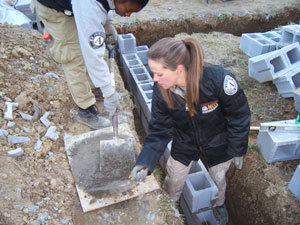She logged more than 1,700 hours of community service through AmeriCorps National Civilian Community Corps
 As an undergraduate at Lafayette, Jamie Papageorgiou ’06 took advantage of the many service opportunities offered by the Landis Community Outreach Center. With Alternative School Break, she traveled to Honduras with Habitat for Humanity and to San Francisco for a project addressing hunger and homelessness.
As an undergraduate at Lafayette, Jamie Papageorgiou ’06 took advantage of the many service opportunities offered by the Landis Community Outreach Center. With Alternative School Break, she traveled to Honduras with Habitat for Humanity and to San Francisco for a project addressing hunger and homelessness.
So when the time came to decide on her next step after Lafayette, she signed up for a 10-month, team-based national service program with AmeriCorps National Civilian Community Corps (AmeriCorps*NCCC).
“[Former Landis Center coordinator] Stephanie Cote was an integral part of both the Landis Center and Alternative School Break and an alum of AmeriCorps National Civilian Community Corps,” says Papageorgiou, an international economics & commerce and international affairs graduate. “She talked about her experiences and related everything back to her two years of service – one as a corps member and one as a team leader. She spoke so highly of the program, while at the same time never sugarcoating the rough times, that I decided I needed to be part of it. Being able to dedicate 10 months to service, with the bonuses of living in a variety of places and making lifelong friends, was the perfect start to my life after Lafayette College.”
Papageorgiou was stationed at the southeast campus in Charleston, S.C. During her 10 months of service, she lived in Alabama, Arkansas, Florida, Kentucky, Louisiana, and Mississippi. Team members lived in their service areas for three to eight weeks. In addition to their regular work week, corps members were required to complete at least 80 hours of independent service. While working with the Low Income Housing Coalition of East Kentucky, Papageorgiou and her teammates also gave their time to a local animal shelter, after-school program, and local parks.
“AmeriCorps changes your perception of the world and yourself in so many ways,” she says. “We lived out of only a backpack, ate on under $4 per day, and wore a government-issued uniform. Sometimes we lived in one room as a team, sometimes in a room with 100 other volunteers, and sometimes in a volunteer house. We compromised on everything and learned how to function as one unit.”
One of the most difficult experiences for Papageorgiou was her service in Louisiana and Mississippi helping in Hurricane Katrina recovery. A project with the Recovery School District program brought her to St. Bernard Parish in Louisiana. Days prior to the scheduled opening of 17 schools, there still were no desks, chairs, or books. Once the schools opened, there still were no curricula, library books, Internet access, or enough teachers. Papageorgiou and her team members were charged with picking up the attendance and bringing it back to program headquarters.
“Every day on the ride home, we would drive past boarded-up buildings, nonfunctioning traffic lights, and piles of debris on sidewalks,” she recalls. “These heaps of what is now trash were all the material possessions of each household. On the day we gutted a house, we had to shovel into a wheelbarrow everything – photo albums, Mardis Gras beads, jewelry, and in one house, notebooks full of nursing school notes.”
In Kiln, Miss., Papageorgiou worked with the Hancock County Long-Term Recovery Committee to interview residents at the center and in their FEMA trailers to assess their needs.
“It’s easy to forget you’re in America when traveling through parts of Louisiana and Mississippi,” she says. “No words can capture the devastation you see. The conditions are inhumane. It’s moving to witness all the volunteers helping in the recovery efforts and the work that gets accomplished.”
Papageorgiou believes she gained invaluable perspective and opportunities through AmeriCorps. In addition to her other recovery work in Louisiana, she helped in the reopening of the Superdome, which sheltered nearly 30,000 residents immediately after the hurricane. While moving the stage on and off the field, she saw sound checks, interviews, and performances by U2 and Green Day. She and other volunteers also were interviewed by Good Morning America’s Robin Roberts.
“AmeriCorps*NCCC gives you the opportunity to see parts of America that you would probably never visit, to meet incredible people, to learn valuable skills, and to understand teamwork,” she says. “With AmeriCorps, I had the chance to volunteer with many different organizations and be part of monumental events.”
The lessons she learned at Lafayette helped Papageorgiou stay focused on the positive impact of her work. She especially credits Char Gray, former director of the Landis Center, who taught Papageorgiou’s First-Year Seminar, “Diversity in the U.S.,” and her Values and Science Technology course, “Hunger and the World Food Supply.”
“The courses opened my eyes to so many things and got me involved with the Landis Community Outreach Center and Alternative School Break,” says Papageorgiou. “[Gray] opened my eyes to new issues, unfamiliar regions, and shocking data. Char’s warm personality radiates and her dedication inspires. Char showed me how important it is to believe in what you do and follow your dream.”
 As an undergraduate at Lafayette, Jamie Papageorgiou ’06 took advantage of the many service opportunities offered by the Landis Community Outreach Center. With Alternative School Break, she traveled to Honduras with Habitat for Humanity and to San Francisco for a project addressing hunger and homelessness.
As an undergraduate at Lafayette, Jamie Papageorgiou ’06 took advantage of the many service opportunities offered by the Landis Community Outreach Center. With Alternative School Break, she traveled to Honduras with Habitat for Humanity and to San Francisco for a project addressing hunger and homelessness.